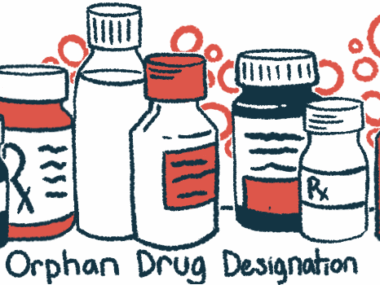FDA grants orphan drug status to RAG-21 for treating FUS-ALS
Ractigen therapy designed for patients with FUS gene mutations
Written by |

RAG-21, a therapy Ractigen Therapeutics is developing for amyotrophic lateral sclerosis (ALS) linked to mutations in the FUS gene, has been awarded orphan drug status by the U.S. Food and Drug Administration (FDA).
Orphan drug status in the U.S. is granted to products aiming to prevent, diagnose, or treat conditions that impact fewer than 200,000 people. This designation offers various benefits for treatments for rare diseases, such as fee exemptions and a seven-year period of market exclusivity should the therapy ultimately win FDA approval.
According to Ractigen, this status will help accelerate RAG-21’s development — important because, “despite progress in ALS drug development, effective treatments remain elusive, especially for FUS-ALS,” the company stated in a press release.
“The FDA’s orphan drug designation for RAG-21 underscores the critical need for innovative therapies targeting ALS, particularly for patients with FUS mutations,” said Long-Cheng Li, MD, Ractigen’s founder and CEO.
Ractigen notes lack of approved treatments for FUS-ALS
ALS is caused by the gradual loss of motor neurons, the nerve cells responsible for controlling voluntary movement. As the disease progresses, muscle weakness worsens, leading to difficulties with walking, swallowing, speaking, and breathing.
While the exact causes of ALS are not fully understood, various genes have been associated with an elevated risk of developing the disease. Mutations in the FUS gene are linked to a particularly aggressive form of ALS, dubbed FUS-ALS, that’s marked by early onset and rapid progression.
The mutations in FUS-ALS lead to the production of an abnormal FUS protein that’s prone to forming toxic clumps inside motor neurons, eventually promoting their death.
RAG-21 is a small interfering RNA (siRNA) molecule designed to target FUS’ messenger RNA, which is an intermediate molecule generated from DNA that contains instructions to make proteins. When RAG-21 binds to FUS’ messenger RNA, it promotes its degradation, which prevents cells from making more of the abnormal FUS protein. Reducing protein levels is thus expected to slow disease progression in people with FUS-ALS.
FUS-ALS represents one of the most severe and rapidly progressing subtypes of ALS, with no curative treatments currently available. … We are committed to developing innovative therapies like RAG-21 to provide meaningful treatment options for patients with ALS.
The investigational therapy is delivered using the company’s proprietary SCAD platform — fully, Smart Chemistry-Aided Delivery. This technology allows drugs to access hard-to-reach tissues, including the brain and spinal cord.
RAG-21 is designed to have durable and potent activity in these tissues. According to Ractigen, preclinical studies showed that RAG-21 lessened the death of motor neurons and improved disease outcomes.
“FUS-ALS represents one of the most severe and rapidly progressing subtypes of ALS, with no curative treatments currently available,” Li said. “We are committed to developing innovative therapies like RAG-21 to provide meaningful treatment options for patients with ALS and other life-threatening rare diseases.”
The FDA’s orphan drug designation is the second for the company for an ALS therapy. Last year, RAG-17, a similar siRNA molecule, was granted orphan drug status for treating ALS patients with SOD1 mutations.






